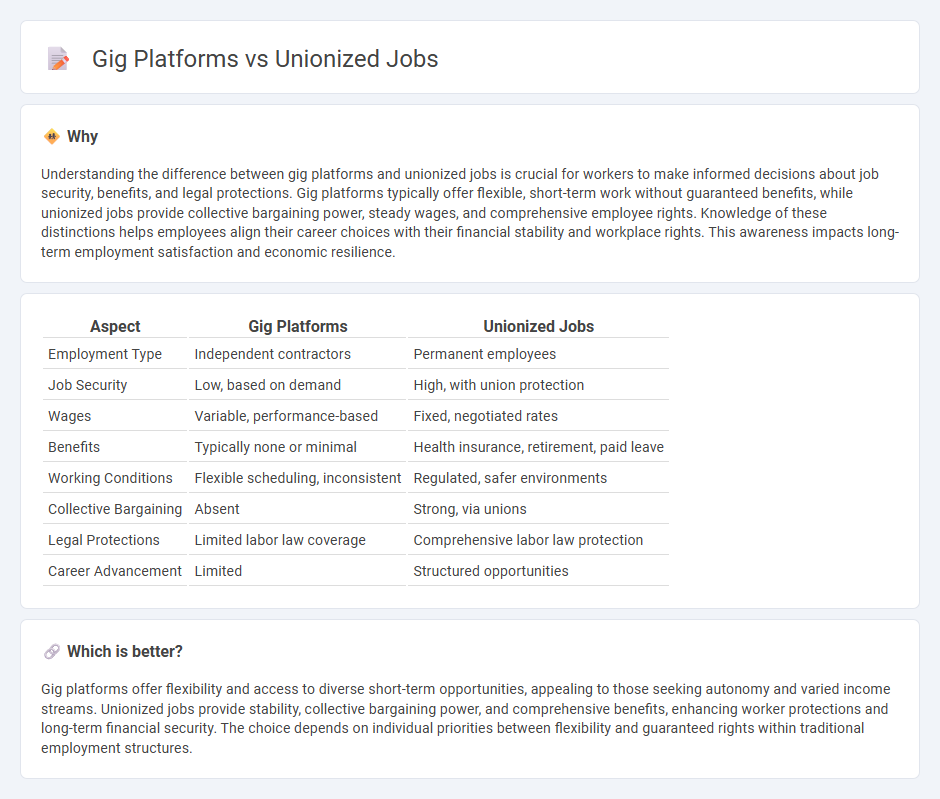
Gig platforms offer flexible work opportunities with immediate access to diverse tasks but often lack traditional employee benefits and job security associated with unionized jobs. Unionized employment provides structured wage agreements, comprehensive benefits, and collective bargaining power that protect workers' rights and ensure fair labor practices. Explore the differences between gig work and unionized employment to understand which suits your career goals best.
Why it is important
Understanding the difference between gig platforms and unionized jobs is crucial for workers to make informed decisions about job security, benefits, and legal protections. Gig platforms typically offer flexible, short-term work without guaranteed benefits, while unionized jobs provide collective bargaining power, steady wages, and comprehensive employee rights. Knowledge of these distinctions helps employees align their career choices with their financial stability and workplace rights. This awareness impacts long-term employment satisfaction and economic resilience.
Comparison Table
| Aspect | Gig Platforms | Unionized Jobs |
|---|---|---|
| Employment Type | Independent contractors | Permanent employees |
| Job Security | Low, based on demand | High, with union protection |
| Wages | Variable, performance-based | Fixed, negotiated rates |
| Benefits | Typically none or minimal | Health insurance, retirement, paid leave |
| Working Conditions | Flexible scheduling, inconsistent | Regulated, safer environments |
| Collective Bargaining | Absent | Strong, via unions |
| Legal Protections | Limited labor law coverage | Comprehensive labor law protection |
| Career Advancement | Limited | Structured opportunities |
Which is better?
Gig platforms offer flexibility and access to diverse short-term opportunities, appealing to those seeking autonomy and varied income streams. Unionized jobs provide stability, collective bargaining power, and comprehensive benefits, enhancing worker protections and long-term financial security. The choice depends on individual priorities between flexibility and guaranteed rights within traditional employment structures.
Connection
Gig platforms and unionized jobs intersect through emerging collective bargaining efforts that aim to improve labor conditions for gig workers by leveraging union-style organization. As gig economy workers face challenges such as job insecurity, lack of benefits, and wage variability, unions advocate for policy reforms, fair wages, and social protections tailored to the flexible yet precarious nature of gig employment. This connection fosters dialogues around labor rights, pushing for hybrid employment models combining gig flexibility with union safeguards to create sustainable work environments.
Key Terms
Collective Bargaining
Unionized jobs provide workers with collective bargaining power to negotiate wages, benefits, and working conditions, ensuring more job security and protection under labor laws. Gig platforms typically lack formal union representation, resulting in individual contracts and limited leverage for drivers or freelancers to demand better terms. Explore further to understand how collective bargaining impacts worker rights and economic stability in both sectors.
Independent Contractor Status
Unionized jobs often provide employees with collective bargaining power, job security, and benefits like health insurance and retirement plans, contrasting sharply with gig platform roles classified as independent contractors who lack these protections. Independent contractor status on gig platforms means workers often face variable income, limited labor rights, and no access to traditional employee benefits, resulting in ongoing legal and policy debates about worker classification. Explore the complexities of independent contractor status to understand its implications for labor rights and economic security.
Job Security
Unionized jobs offer higher job security through collective bargaining agreements that protect workers from sudden layoffs and ensure stable employment conditions. Gig platforms, characterized by freelance or contract work, often lack these protections, leading to unpredictable income and limited worker rights. Explore detailed comparisons to understand how job security impacts workers in both environments.
Source and External Links
27 High-Paying Union Jobs (With Salaries) | Indeed.com - Unionized jobs are careers supported by labor unions that advocate for fair wages, safe conditions, and workers' rights across various sectors like government, skilled trades, education, and law enforcement, often providing benefits and collective bargaining to improve work conditions.
The Most Unionized U.S. Occupations in 2022 - Smartest Dollar - The highest unionization rates are found in public sector jobs such as education, public administration, and utilities, with strong union presence helping cover business insurance, healthcare, and improving worker protections despite overall declines.
Union Members - 2024 - Bureau of Labor Statistics - Union membership is highest among workers in education, training, library, and protective service occupations, with about 10.3% unionization rates overall in management and professional jobs, reflecting ongoing union representation in specific sectors.
 dowidth.com
dowidth.com